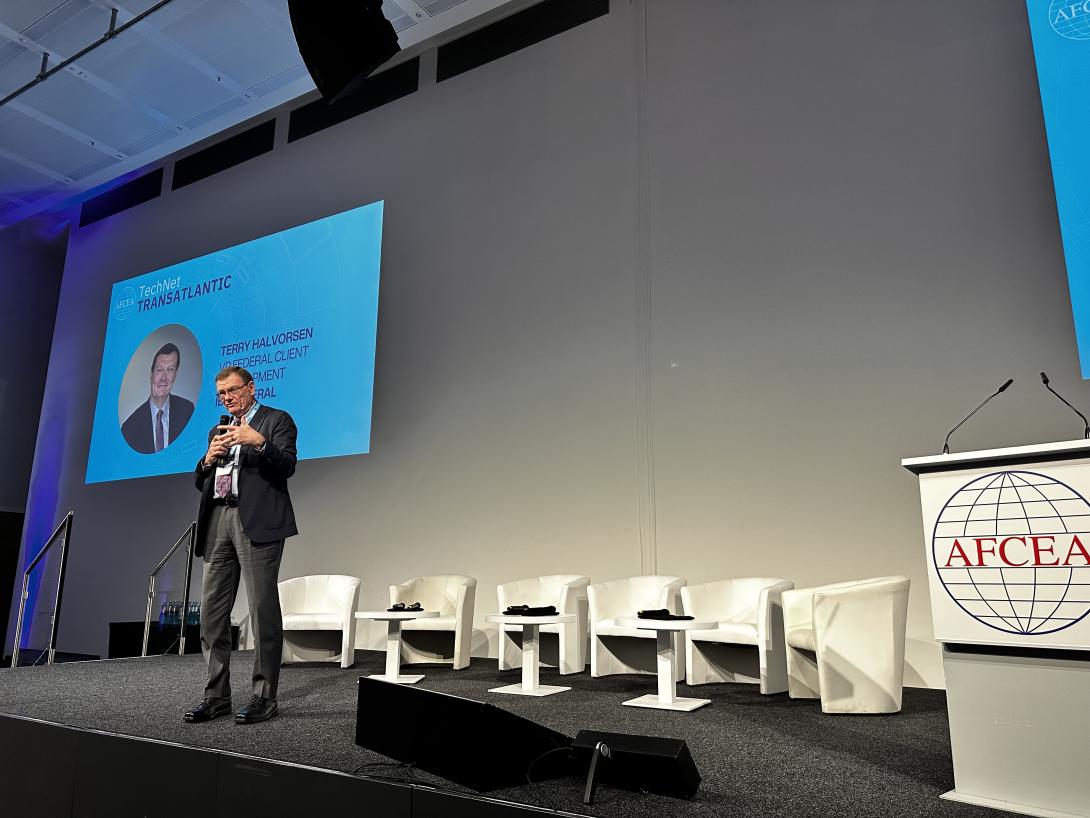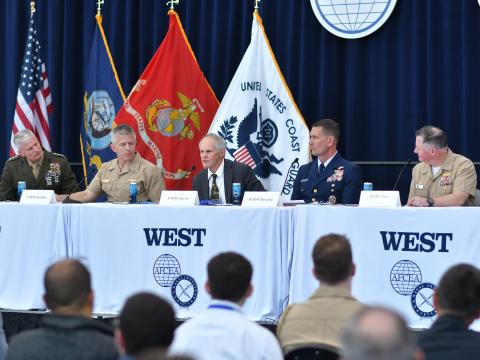Halvorsen's Headings: Modernize Military Operations
In an era of rapidly evolving threats and digital warfare, military organizations must radically transform their approach to technology adoption and data management. U.S. military leaders need to stop saying no to technological changes, advised a former chief information officer of the Department of the Navy.
Terry Halvorsen, speaking at AFCEA’s TechNet Transatlantic conference on December 4 in Frankfurt, Germany, emphasized that resistance to technological change is no longer an option.
“Technology is here,” he said. “And that technology is going to happen even if we pretend it isn’t."
One problem is the military’s inefficient use of available data. Halvorsen cited a concerning statistic that only about 5% of the Department of Defense’s (DoD's) collected data is used “on the best days.” And only 25% of that small portion actually reaches commanders in time for them to make mission-critical decisions.
“If I told you in industry ... ‘Hey, listen, you told me data was the most precious resource I have, but I’m throwing away 85% of it,’ I’d be gone today. Yet we do that every day. We say it's our most precious resource, but we basically throw it away,” Halvorsen said.
The current IBM executive called for the integration of artificial intelligence (AI)—or what he asserts it should be referred more accurately as “augmented intelligence.” AI represents a crucial advancement in the warfare of modern militaries. However, its integration requires a fundamental shift in military culture and processes.
Advancements in quantum represents another frontier for the military, particularly regarding post-quantum cryptography, Halvorsen continued.
“If you are not today looking at quantum-safe technologies as part of your current cybersecurity, you are wrong, wrong, wrong, and you are going to pay a price for that,” he warned. Halvorsen emphasized that waiting for fully developed quantum computers would also be a mistake, as current computing capabilities can already begin to use quantum-safe algorithms.
The military should also leverage software-based encryption, as opposed to traditional hardware-based cryptography—which he calls both financially and operationally unsustainable.
“We are losing the economic crypto war,” he stated. “We are spending more to protect than the enemy has spent to upset us. Software lets us start to change that current math. We can get software cheaper. We can change it faster. It makes their lives a lot harder.”
Regarding cost-effective lessons about open-source intelligence, Halvorsen highlighted some lessons learned from Ukraine, which has leveraged valuable intelligence about Russian troop movements and operations from unconventional sources like traffic cameras and networks, as well as social media.
In addition, with the move toward even more integrated coalition warfare, the department's continuous use of restrictive “Secret-No Foreign” classifications continue to hinder allied communications, the former CIO said. Here, software-based solutions can offer flexibility and implement varying levels of classification for different coalition partners, enabling more efficient information sharing while maintaining security.

However, in Halvorsen’s view, the most significant barrier to military technological advancement lies in the acquisition process—not the technologies.
“It is absolutely ridiculous that a $500,000 contract costs the same as a $2 billion contract to execute,” he noted. “Our contracting and acquisition system is 100% our biggest risk [to technological advancements]." Small businesses and mid-sized companies—from where many innovative technologies are emerging—are particularly disadvantaged in the current acquisition environment.
The DoD needs more streamlined acquisition processes that facilitate rapid technology adoption, not just pockets of agile acquisition.
Lastly, Halvorsen said, the modernization of military technology also requires a fundamental shift in risk management approaches. “It seems that risk management is our new way of trying to say that we are not going to have any risk, and so, we're going to say no. We should ban the term ‘no.’”
“Let's get back to the mission,” he said. “We need to think about capabilities, [like] ‘I need this data to come in 24 hours or less.’ I saw a contract that came out recently that said, ‘We need AI,’ and it listed all the technical specs, but it never said, to do what? What’s the outcome?”
TechNet Transatlantic is organized by AFCEA International in conjunction with the AFCEA Europe office. SIGNAL Media is the official media of AFCEA International.




Comments